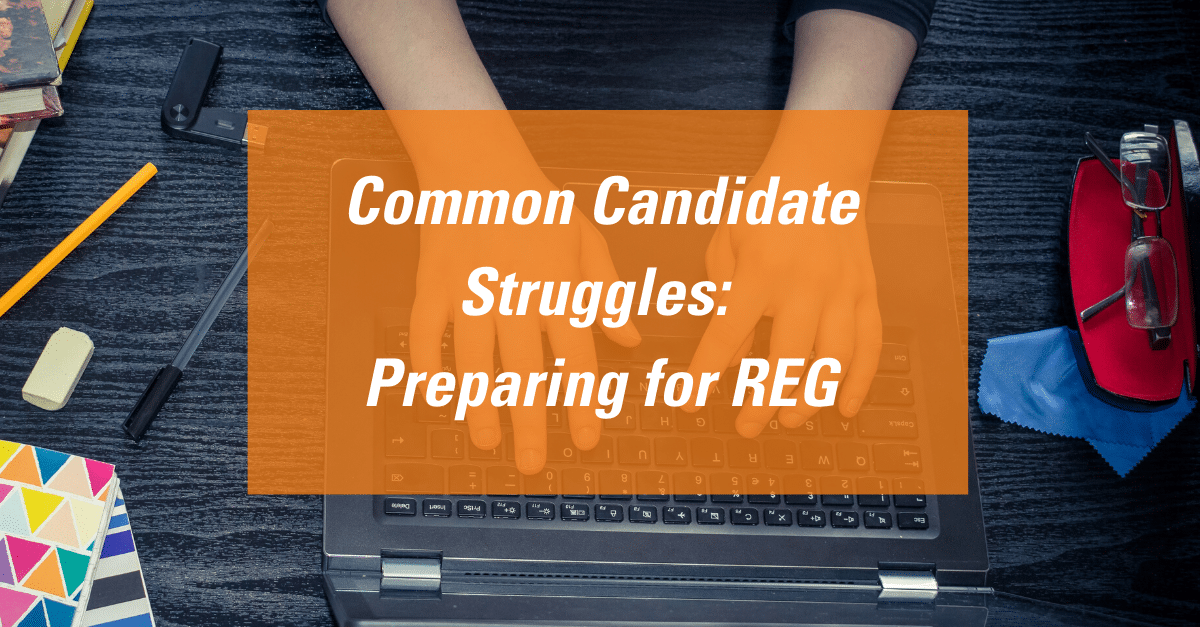We all know that the CPA Exam is made up of four sections – AUD, BEC, FAR and REG – and each is made up of difficult questions that primarily touch on different elements of accounting, from tax law to financial accounting and more. While there’s a lot to learn, it’s entirely possible to pass each section on your first try with a proper study plan, effective study materials and adequate study time. We’ve answered some of the common candidate struggles with some CPA Exam study tips for your REG exam below – take a look.
Before we dive into the answers to common struggles, what does REG actually test you on?
The REG section of the CPA Exam focuses primarily on taxation, but also touches on ethics and business law. The tax portion of the exam focuses on individual tax, business entity tax (C-corporations, Partnerships, Sole Proprietorships, LLC’s, S-corporations, estates, etc.), and taxation of property transactions. Candidates should be familiar with taxation concepts from a preparation and planning perspective.
What should a candidate expect when planning to sit for REG?
Like other sections of the CPA exam, the REG exam is comprised of 76 multiple-choice questions and eight simulations (“SIMS”). While many candidates likely have a strong understanding of debits and credits and journal entries, the REG exam focuses on federal taxation. Candidates may be asked to complete portions of a tax return, calculate basis, or analyze book to tax differences. This information may be challenging to candidates with limited tax experience, who have only had a few tax courses in college or who have limited exposure to tax accounting in the workplace. We would recommend using a CPA review course that has practice exams and a strong set of study material on this topic.
What’s a top common mistake candidates may make on REG?
A common mistake that candidates may make on REG (or any other portion of the exam) is getting stuck on one question. Remember – the CPA Exam is tough! You may be tempted to spend a lot of time on one SIM because you are so close to getting the right answer. Candidates should budget their time wisely and know when to move on to the next question, otherwise they may run out of time on the exam!
What do candidates typically not study for enough/make mistakes on?
I think that some students may underestimate the importance of simulations. Yes, there are lots of multiple choice questions, but SIMs make up 50% of your score. Make sure to save enough time to get through all eight SIMs, and most importantly, practice SIMs so that you are prepared for exam day!
As for content, while federal tax is the primary focus of the REG exam, it is still important to study business law and ethics. Make sure you understand topics such as contract law, business structure, and the Uniform Commercial Code.
How do you recommend approaching SIMs?
Make use of the Authoritative Literature! One tip that CPA candidates often overlook is that the Authoritative Literature is available to use on all SIMs (not just research SIMs). The Internal Revenue Code (IRC) addresses many tax situations that candidates are likely to encounter on the exam.
What’s the best advice you’ve ever been given?
Develop a routine:
Whether you are studying while you are still in school, before starting a new job, or while working full time, it is so important to develop a designated study plan and routine. Set clear goals – do a certain number of questions per night, dedicate your morning train ride to completing SIMs or even commit to studying two hours a day. Whatever you do, make a study plan and stick to it!
Practice makes perfect:
Make sure to focus on your “problem areas” and keep practicing MCQs and completing SIMs. The more you expose yourself to the content, the more information you will absorb and the closer you get to that passing score.
Treat yourself:
When you study for the CPA Exam, you may feel like there is no end in sight. When I took the exam, it was helpful to have something to look forward to. After you take one section of the exam, treat yourself to your favorite meal, plan a fun night with friends or spend a relaxing day watching movies. After you take some time for yourself, it is much easier to get back into the groove of studying for the next section of the exam.





